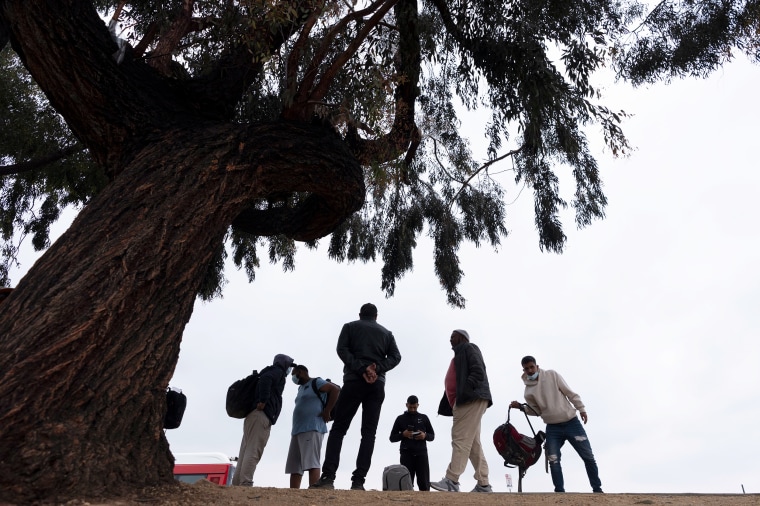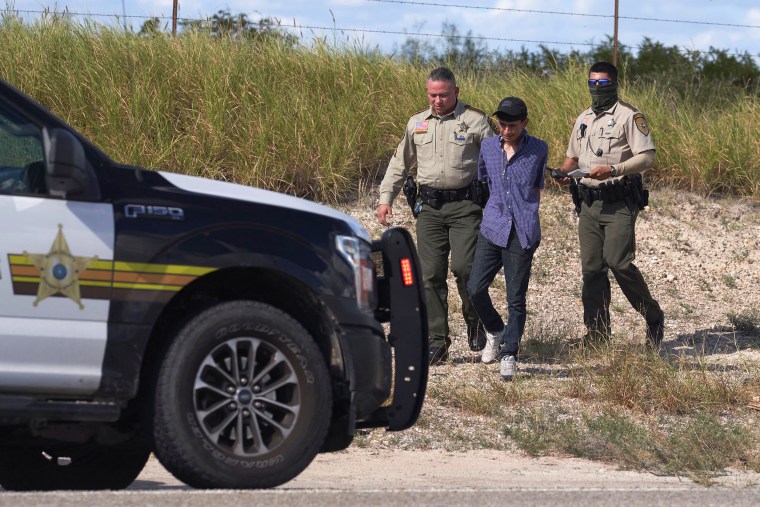After a week, has Biden’s border order had an effect? Migrant numbers are down, but there are glitches

A week after President Joe Biden signed an executive action to “suspend the entry” of immigrants who cross the border illegally, the number of migrants has fallen by 25%, but officials are still releasing some illegal border crossers inside the U.S., several Department of Homeland Security officials said.
In some areas, border agents are pushing migrants from Central America back into Mexico instead of deporting them to their home countries, as the executive action detailed, according to immigration advocates and an internal memo seen by NBC News.
The memo was first reported by the New York Post.
For more on this story, tune in to NBC Nightly News with Lester Holt tonight at 6:30 p.m. ET/5:30 p.m. CT or check your local listings.
A senior DHS official said that early numbers indicate the executive action has deterred some migrants from crossing the southern border. Illegal crossings were down from 4,000 per day last week to 3,000 per day as of Tuesday, according to Customs and Border Protection data obtained by NBC News. Biden’s executive action limiting which migrants can claim asylum went into effect at 12:01 a.m. Wednesday, June 5.
But even though the action bars migrants from seeking asylum if they crossed the border illegally, the administration is still releasing illegal crossers inside the U.S. to live while they pursue asylum claims in immigration court, the DHS official said.
The senior DHS official said that some migrants who have crossed illegally since last Wednesday and been released into the U.S. may be found ineligible at their asylum hearings and sent home for violating the executive action.
And despite the action stating that the U.S. would deport anyone found ineligible for asylum back to their home countries, immigration advocates say that, in some sections of the border, migrants from Guatemala, Honduras and El Salvador are being sent back into Mexico instead.
The senior DHS official said that without money from Congress for more detention space and deportation flights, Border Patrol will continue to be forced to release some illegal border crossers into the U.S., particularly those from countries that Mexico is reluctant to accept.

But the official said those releases, which were occurring prior to the executive action, have fallen by more than half since it went into effect.
In San Diego, where the number of migrants from China and elsewhere in the Eastern Hemisphere has soared this year, the memo states that Border Patrol agents are instructed to send migrants from Cuba, Haiti, Nicaragua, Venezuela, Guatemala, El Salvador, Honduras or Mexico back into Mexico, but to release migrants from the Eastern Hemisphere and any other countries inside the U.S.
A temporary drop?
The senior DHS official said it is still too early to judge the effectiveness of Biden’s new policy.
A representative of the Border Patrol union expects the decline in illegal border crossings after the executive action went into effect to be short-lived.
“We do see those declines in crossings whenever there’s a new policy, but these smugglers quickly shift their strategies and their business, and smuggling humans and people will continue,” said Hector Garza, vice president of the National Border Patrol Council, the agents’ union, and a 24-year veteran of the Border Patrol who is based in Laredo, Texas.
Garza said the executive action has not introduced real change and described the state of affairs at the border as “status quo.”

The new policy could also soon be blocked in court. In a court filing in Washington on Wednesday, the American Civil Liberties Union led a lawsuit with several immigration organizations against the Biden administration seeking to end the executive action.
The lead attorney for the lawsuit, Lee Gelernt, said Biden’s policy is “near identical” to one enacted by Trump that the ACLU was successful in blocking.
“We’re filing this lawsuit because this ban is patently illegal. The Trump administration enacted a near identical asylum ban. We sued over that. We won. We hope to win again,” Gelernt said.







